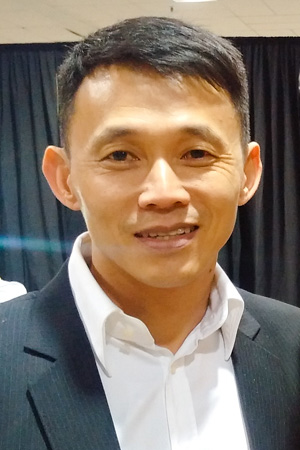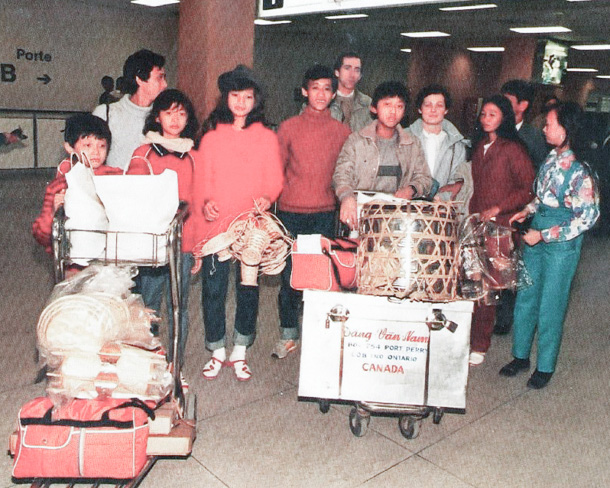
This month, Winnipeg engineer Ivon Forero bought halal meat for the first time.
She was excitedly preparing to host a family of Syrian refugees for Sunday lunch at home with her husband, local business owner John Garcia, and their two children. They would serve their guests pollo criolla, a Colombian chicken dish. The children would play together; the adults would talk.
The pair had decided to invite the Syrians over when they heard the father was struggling to find work in Canada without success.
"It's hard to find a job as a refugee even if you have experience," Forero says. "We thought it was just us, but it's actually a general thing."
As former refugees from Colombia, Forero, 30, and Garcia, 35, are experts on the subject. Sponsored by the refugee committee of St. Matthew's Anglican Church, they were granted asylum in Canada in 2009 and settled in Winnipeg.
When they heard that their initial refugee sponsors were now supporting a family from Syria, Forero and Garcia wanted to pitch in.
"The most important thing we thought we could do was to help them understand that nothing happens tomorrow," she says. "It takes time.... We came here with seven suitcases and $200. Now, we have a house and a car. I went to school and my husband went to school, too. We had the opportunity to share that with them in our home."
As the federal government scrambles to transport the rest of its promised 10,000 Syrian refugees to Canada by year's end, and another 15,000 within two months, Canadians continue to step forward and offer support to new arrivals.
In this Tyee series, we've seen how supporting asylum-seekers can benefit residents here at home -- creating a sense of purpose, global awareness and new friendships.
But previous refugees to Canada are also participating in these efforts, offering everything from simple meals to expert advice to newcomers. A few are even sponsoring families.
"I was super glad to have them," Forero says of hosting her Syrian guests. "It's nothing compared with what people have done for me. It was good for us and for our kids."
Now, the volunteers who brought her family to Canada are sponsoring yet another Syrian family. "When they come [to Winnipeg], hopefully we can also help them in their process," she says.
Sponsoring 'a no-brainer'
A number of Syrians now settled in Canada are also gearing up to help their compatriots fleeing the civil war. Among them are families at Knox Presbyterian Church in Morrisburg, Ont.
The congregation's pastor, the Reverend Firas Shammas, grew up in the Syrian city of Latakia, where he ministered to a small Presbyterian community in a port city. He came to Canada with his wife and two children in 2013 after the civil war broke out in his home country.
He's now supporting several groups of volunteers in three nearby towns with their efforts to sponsor Syrian refugees.
"Knowing the kind the pain and hardship these people have undergone is what makes any person wish to do anything for them," Shammas says. When he was in Syria, Shammas worked with internally displaced people. Being forced out of one's home is "by all means a tragedy," he says, and any efforts to help refugees make a massive difference in their lives.
Helping refugees also helps the helpers, he points out. "On a personal level, working closely with suffering people is a healing and eye-opening experience. It makes us handle the sources of stress and pain in our lives in a better way, and it makes the helpers appreciate the good things in their lives which they take for granted -- for example, the simple fact that you can go back to your home after a long day of work."
Tom Tang is another former refugee who felt compelled to help with the crisis. As he watched the tragic news of boatloads of Syrian refugees drowning in the Mediterranean Sea this summer, he saw similarities to the massive human exodus that brought him and his family to safety in Ontario decades ago.
"A lot of Vietnamese risked their lives crossing the ocean to find a better place for our families in wooden boats," the 41-year-old Toronto accountant says. "The parallel is there."
Tang's sister Lien was 11 when their parents put her and another brother on a rickety boat to escape war-torn Vietnam in the 1970s. They ended up in a Malaysian refugee camp before a couple in Port Perry, Ont. sponsored them in 1981.
"When you ask her, she cries about it," Tang says. "There were raids at sea, and many drowned just trying to find safe harbour... a lot of Syrian families are going through the same thing. They're leaving the civil war to not only find a better life, but a safer one. It's heartbreaking."
Tang came over five years later with his parents and other family members after Lien, by then a teenager, sponsored and reunited them.
Today, through the charity Lifeline Syria, Tang is sponsoring a family of five Syrian refugees currently in Lebanon. He's not doing it alone -- four friends stepped forward to share the task of helping them settle in Canada. All are former refugees like him, from places like Vietnam, Laos and Tanzania.
"We have the same thinking: to pay it forward to the people currently in need," Tang says. "It's a no-brainer for us to actually sponsor some families. I was sponsored by a Canadian family in Port Perry. If they had thought, 'It's a lot of work,' 'It's too much responsibility,' or 'It's not our problem,' my family wouldn't be here, and I wouldn't be in the position I am now."
It was because of the hospitality of individuals that the Tangs established themselves in Canada, he says. "Really, the least we can do is to pay back to another family what Canada has given me."
'A ripple effect'
The Tang's sponsors were Rosemary Connell, now 64, and her husband Clayton. They've since moved from Port Perry to near Lindsay, Ont.
When the Tang family was fully reunited at Connell's home in 1986 -- only months after she and her husband adopted two Brazilian boys -- Connell remembers looking out the window and seeing nine children in the backyard sandbox: her four biological kids, the Brazilian brothers and the refugee children all playing and yelling together in a mix of Portuguese, Vietnamese and English.

"For a while, we had 17 people in the house," she recalls. "I'm not going to make it sound like it was all roses. If you want the honest answer, there were times it may have overwhelmed our biological children."
But despite a few rough patches, she still feels the experience was "well worth it" because of how much her family learned from the experience. "It has made them the people they are," she muses. "They are tolerant, accepting of differences and busy themselves."
Later, Connell was visiting a grown-up Lien Tang's house and saw a photograph on the wall of Lien's extended family of 43 people on holiday -- the original two children Connell sponsored, their parents and siblings who followed, and their spouses and offspring.
"For some paperwork and helping them get acclimatized, they've gone on with their lives and they're doing well. They're settled," she realized then. "It didn't really take too much effort for our family to make that big a change in their life."
Considering how much the Tangs went through to escape the war in Vietnam, when Connell thinks of Tang's sponsorship efforts today she sometimes asks herself, "What are they doing helping somebody else?"
But she "absolutely" doesn't regret her own choice decades ago, and feels "so proud" that Tang too has heard the call to help. In some ways Connell is not surprised, as she describes the entire Tang family as very generous.
She recalls the bitterly cold January day she picked up the extended family at the airport. They'd arrived only with a trunk as luggage. "I thought it was their earthly possessions, but it turned out it was actually full of gifts for people," she says.
Then eight-year-old Tom Tang was among the arrivals, shivering in flip-flops and thin cotton clothing. "He's come a long way in that time to get established, and now he's reaching out to somebody else," Connell says.
For Tang, being sponsored doesn't just change refugees' lives for the better, but also generations of their descendants -- and members of the families welcoming them.
"It's a sort of ripple effect," he explains. "You not only help people, but you potentially can enrich your own family by bringing members of different ethnic groups.
"Obviously I don't want to have such high expectations that every experience will be the same. Whether they join our extended family, become friends, or they get on their feet and move on -- either way, just knowing we can change someone's life is more than enough for us."
Please note our comment threads will be closed Dec. 21 to Jan. 3 to give our moderators a well-deserved break. Happy holidays, readers. ![]()
Read more: Rights + Justice














